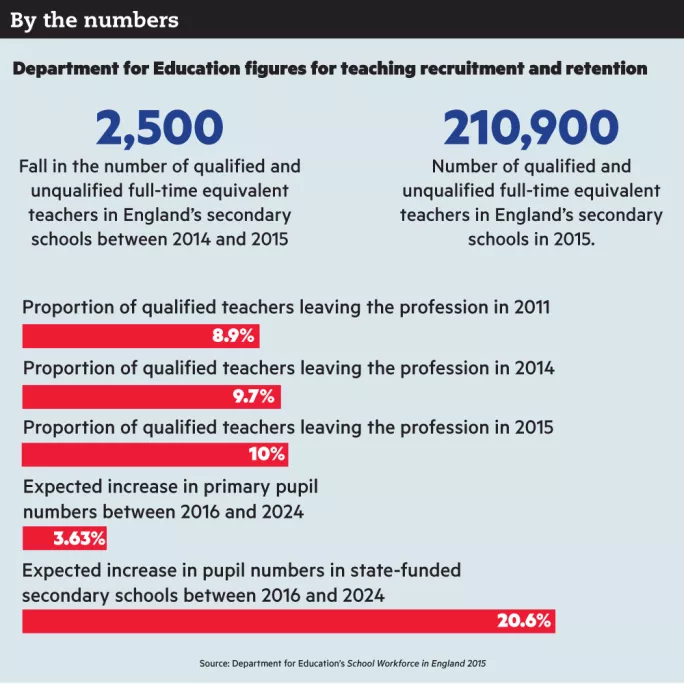Teachers ditch classrooms to become private tutors

Private tuition firms are reporting a huge spike in applications from teachers who are turning their backs on the pressures and long hours involved in working in schools.
It comes amid warnings of a growing teacher recruitment crisis and falling pay in schools, at a time when tutoring demand is predicted to soar under proposals to expand grammar schools.
‘Deluged’ by applications
William Clarence, a London-based firm that works mainly with full-time tutors, has seen applications from experienced teachers double in the past year.
Managing director Stephen Spriggs said that he had been “deluged” with applicants - around 85 teachers send him their CVs each week. He attributed the increase to teachers’ growing workloads and the burden of bureaucracy in schools.
He said: “There’s a lot of stress in teaching. People probably went into it because they enjoy teaching - working directly with pupils and seeing the results - but then actually don’t get to do as much of it as they’d like.”
Tutoring offered “comparable pay without the school politics”, as well as greater flexibility, he said. Rates start at around £20 an hour, but the most qualified tutors - those who can help pupils pass entrance exams at independent schools such as Eton and Harrow - can charge up to £200 an hour.
Keystone Tutors, which is based in London and Oxford, has noted a significant increase in applications over the past 18 months. Its director of education Ed Richardson said that teachers putting in long hours at school were realising that they could earn the same amount in far less time as a £30-an-hour tutor, the going rate in London.
Keystone has seen a particular surge in applications from Teach First graduates.
Tutoring offers comparable pay without the politics
Mr Richardson said: “They’re going into tutoring and cover work because they want to move away from the classroom and need to earn money in an interim period before they become a lawyer or enter a graduate programme.”
Just over half of Teach First graduates remain in the profession two years after qualifying as teachers, and this drops to 43 per cent in the third year, according to National College for Teaching and Leadership statistics, published in July.

Malcolm Trobe, the interim general secretary of the Association of School and College Leaders, agreed that heavy workloads could be encouraging teachers to consider going in to full-time tutoring.
He said: “The workloads have always been considerable, but the accountability system has made it even more pressurised.”
“The big issue is if this is causing an additional pressure on teaching recruitment and retention, because we know that there’s a crisis in terms of teacher supply.”
Teaching pay fell in real terms between 2010 and 2014, according to Organisation for Economic Cooperation and Development (OECD) figures released last month. The profession was awarded a 1 per cent rise this year.
Part-time profession
There is evidence that an increasing number of teachers are fitting in part-time tutoring around their day jobs. First Tutors, a large agency that supplies private tutors across the country, has seen a 21 per cent annual increase in applications since last year.
Director Anita Lee said: “Once upon a time, teachers probably kept quiet if they were tutoring on the side, but as it becomes more common, people will become more open about it.”
However, she warned that teachers who carried out part-time tutoring should avoid working with pupils in their class or even school, in case they are accused of favouring their tutored children.
More than four in 10 state-school teachers have been paid to work as private tutors in addition to their main jobs at some point during their careers, according to a Sutton Trust poll earlier this month.
Tuition firms contacted by TES generally viewed Theresa May’s plans to open new grammar schools as an opportunity for them to grow. But most said that they did not expect the plan to dramatically affect the number of applications from teachers, owing to the already high numbers that were looking for tutoring work.
You need a Tes subscription to read this article
Subscribe now to read this article and get other subscriber-only content:
- Unlimited access to all Tes magazine content
- Exclusive subscriber-only stories
- Award-winning email newsletters
Already a subscriber? Log in
You need a subscription to read this article
Subscribe now to read this article and get other subscriber-only content, including:
- Unlimited access to all Tes magazine content
- Exclusive subscriber-only stories
- Award-winning email newsletters